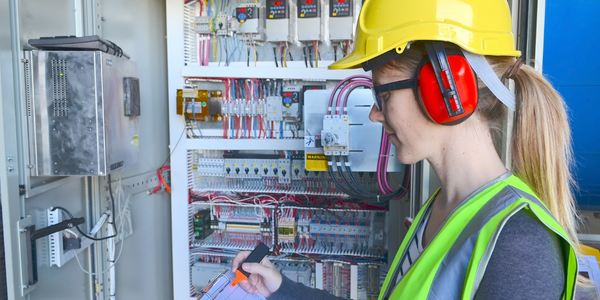What's the difference between a maintenance technician and a mechanic?

The difference between a maintenance technician and a mechanic is not very clear on the surface to people that are not heavily involved in the industry. They both apparently do the same things, clock in at roughly the same time, and deal with the same situations to some extent.
Some people argue that the difference between a maintenance technician and a mechanic is a matter of semantics—that people only use the word “technician” interchangeably, without much difference on the matter.
However, the two positions are very different. A maintenance technician generally has more training in specific situations than a mechanic. However, a mechanic will be able to deal with a wider variety of situations in a shorter period of time.
To further complicate the matter, these different roles overlap in some areas, but each professional does the job slightly differently. In specialized applications, a maintenance technician may be required, while a mechanic may be needed in smaller organizations that cannot afford specialized training for their people.
In order to break this down, let's start with the core concepts behind each role, the skills needed for each field, and the responsibilities and industries in which you find these professionals. With this in mind, we can more fully the difference between a maintenance technician and a mechanic.
The core concepts behind each role
In order to keep everything straight, here are the overall similarities and then the specifics of each particular role. Because there's a lot of overlap, some things are repeated. However, those things are generally presented, learned, acquired, or are in some way different in each role.
Overall similarities
Some of the most basic similarities between a maintenance technician and a mechanic include:
- Both professions require a high school diploma, at the very least.
- High technical abilities are needed.
- People in these professions tend to be extremely detail-oriented and mechanically minded.
- They also tend to have high organizational skills and work well under pressure.
- And finally, both roles are flexible and adaptable to the organization or companies' needs at any given moment.
Many of the similarities in these two roles center around and on the tasks that these professionals accomplish, such as working on machinery, discovering solutions to problems, and generally fixing things. The difference is typically in the specialization of each role and their place in the company as a whole.
Now that we've covered the similarities, what are the major differences and why are they two separate professions?
Responsibilities of a maintenance technician
A maintenance technician specializes in a particular piece of machinery, process, or another specific task. Their training centers around machinery, so that they will be invaluable when their expertise is needed at a critical point in time.
Unlike mechanics, maintenance technicians focus on a narrow skillset and develop it to a finer degree over time. While they may branch out into different skill sets, their biggest advantages are that they are specialists, not generalists.
Duties of a maintenance mechanic
On the other hand, mechanics are trained and taught to be useful in a wide variety of situations. They study and learn the basics of machinery, processes, industry regulations, and company policies, in order to fill in the gaps and offer assistance when needed.
Maintenance mechanics are particularly valuable in smaller companies who cannot afford to hire specialized technicians, but still need a mechanic or a team of mechanics on staff to solve multiple small and midsize problems. Depending on the application in question, mechanics may be preferred over maintenance technicians in situations such as general tune-ups, overall checks, and inspections.
When these ideas, theories, and education hit the road, what happens? What skills do these professions use the most? What skills should maintenance technicians and mechanics have before they work on facility maintenance?
Let's take a look.
The skills needed to become a maintenance technician or mechanic
Every profession has a basic skillset that everyone in that profession needs. Furthermore, technicians and mechanics can develop skills to enhance their job prospects. Here are a few of those skills that separate top performers from the rest of the pack of maintenance technicians and mechanics.
A fine eye for detail
Maintenance mechanics and technicians are top-notch at performing repairs. This is the bread and butter of a maintenance professional, no matter what level. Noticing when small parts are out of place can go a long way in an organization.
Observant and proactive behaviors
If you can't observe the machines that you're working on, you may miss major repairs that can lead to thousands of dollars of damage down the road.
Leadership
Training and managing other employees is an essential skill, especially as you gain seniority. A lot of companies have very specific protocols, rules, and machines. Their mechanics and maintenance technicians need to know what the company needs and train new people accordingly.
Social adaptability
Get along with people from all walks of life. As someone who interacts with people from different departments, you should develop strong people and connection building skills, so you can thrive when meeting anyone. Often, you might be in an unpredictable environment, so fostering workplace connections can provide a strong foundation.
Prioritize responsibilities
As a maintenance mechanic or technician, you'll be juggling many tasks throughout the day. Every small detail matters, so you'll want to be attentive, but also, ensure that higher priority items are taken care of, followed by lower priority tasks. This is a skill that comes with practice and experience.
Apart from these umbrella traits and habits, the biggest difference is that a mechanic will need to see the big picture more often than the maintenance technician ever will. Maintenance technicians need to be detail-oriented and examine minute, specialized problems when they see them. Mechanics need a much higher overview of the entire situation in order to bring their expertise to the problem.
Another thing to note is that a lot of these skills come from vocational training, or other hands-on apprenticeships, experiences, or on-the-job training. While many companies require a high school degree at the very least, it might not necessarily be a requirement for a specific mechanic role. Technicians, as a rule, will have more hands-on experience, while mechanics may have more certifications and standardized training.
The two roles are similar enough that they may be interchangeable; however, this is not common.
Their responsibilities have slight differences, which we will look at next.
The core role expectations of maintenance technicians and mechanics
The different responsibilities that maintenance technicians will face from companies are going to vary widely, depending on the company and industry in question. Some technicians may only work on a specific application, such as sheet metal on airplane frames. Other technicians may work on a specific type of product, machine, process, or other individualized situation that a company needs a specialist to manage.
Mechanics are more likely to work as temporary workers or as generalists. They are much more flexible and generally can move from company to company more quickly than a technician can adapt to the needs of different businesses.
Maintenance technicians also need to be more proactive than a mechanic in many situations. Since they are the experts on a particular piece of machinery, they're the ones that know best when things need to be fixed.
That being said, the responsibilities of maintenance technicians and mechanics are typically very similar. The real difference is in how specialized the company or industry in which they work needs them to be on the job.
For example, a maintenance technician and a mechanic working on aircraft maintenance may have the same baseline certifications. However, one is classified as a technician, and one is classified as a mechanic. This is because the technician only works on sheet metal, paint, or some other very specific part of the plane in question. The mechanic works on everything, as the company needs from her. She may also have more general certifications, such as an A&P license, while the sheet metal technician may only have a sheet metal certification.
Industries where you find maintenance technicians and mechanics
In almost every industry that requires a plant, a manufacturing center, or a distribution center, you will find me as technicians and mechanics to care for the machines. It's just part of everyday maintenance in these situations.
Depending on how wide your definition of a maintenance technician is, you may find them in almost every industry around the world today. They can take care of lawns, buildings, facilities, office spaces, and every area that needs maintenance. However, the term generally refers to people who work in industries such as manufacturing, distribution, and heavy maintenance.
Let's take a look at these three industries and what maintenance technicians and mechanics do on a daily basis for them.
Manufacturing
Manufacturing plants rely on their assets to work in a timely, organized, and functional way. When these assets go down and it’s not planned, this could affect every level of employee and consumer down the line. Supply chains around the world depend on these plants and centers getting materials, parts, and items into the shipping containers on time. These can range from nuts and bolts to highly specialized and delicate medical equipment needed to save lives.
Both maintenance technicians and mechanics are employed in these companies on a regular basis. They will have different roles, but these are highly dependent on the needs of the company and on the size of the facility. In larger facilities, multiple people will be employed in these roles, due to the company's needs.
Distribution
Similar to manufacturing, distribution centers have a lot of heavy equipment in a lot of moving parts that all need to be maintained in order for the center to work as intended. Downtime in these cases can be catastrophic.
Maintenance technicians and mechanics ensure that all the machinery is operational, safe, and functional on a day-to-day basis. In these situations, maintenance technicians may be used more because of the nature of the machinery in question. For example, a specialized cell conveyor belt throughout a facility needs somebody who understands the system better than a general mechanic would approach the conveyor.
Even if a mechanic specializes in conveyor belt systems, he will still have a steep learning curve in order to understand the one in question. A technician, who has been trained on the system, will be better equipped to help the company manage and maintain its assets and processes. They will also be able to train new technicians on the job, instead of relying on generalists to do the specialized work.
Heavy Maintenance
Heavy maintenance work is most commonly needed on items such as aircraft, roads, infrastructure, and other major assets that need specialists to work on them from time to time. It can also be called industrial maintenance. While it may be folded into companies’ overall maintenance at some level, in many cases an entire different company or contract workers do these jobs.
In the heavy maintenance world, mechanics are more in demand. These companies specialize in general maintenance as opposed to highly specific jobs. This creates a demand for mechanics who are experienced in many different fields, as opposed to somebody who knows a single system inside and out.
A lot of the supply and demand created by heavy maintenance companies in the industry as a whole is heavily dependent upon other industries. With such a general and broad scope, technicians are better off searching for opportunities in more specialized fields or companies.
In conclusion
At the end of the day, the difference between a maintenance technician and mechanic is how specialized they are and in what kind of certificates, training, and hands-on experience that these professionals generally bring to companies.
Small companies may not have the resources to hire specific maintenance technicians. In these instances, mechanics may be a better choice. On the other hand, larger companies need specialization and specialized technicians in order to bring their assets, machinery, and processes to the next level. It all depends on the company in question.
Regardless, both of these professions have unique roles in many different industries and are extremely valuable in the manufacturing, distribution, and heavy maintenance industries, in particular.
Maintenance technicians and mechanics ensure that functional machines in a system perform on time, on schedule, and as expected, without downtime or delays.
Want to keep reading?
What is the difference between a maintenance worker, a maintenance technician, and a maintenance engineer?
What kind of career advancement is available to maintenance technicians?
How to Create a Standout Maintenance Technician Resume
4,000+ COMPANIES RELY ON ASSET OPERATIONS MANAGEMENT
Leading the Way to a Better Future for Maintenance and Reliability
Your asset and equipment data doesn't belong in a silo. UpKeep makes it simple to see where everything stands, all in one place. That means less guesswork and more time to focus on what matters.


![[Review Badge] GetApp CMMS 2022 (Dark)](https://www.datocms-assets.com/38028/1673900459-get-app-logo-dark.png?auto=compress&fm=webp&w=347)
![[Review Badge] Gartner Peer Insights (Dark)](https://www.datocms-assets.com/38028/1673900494-gartner-logo-dark.png?auto=compress&fm=webp&w=336)
